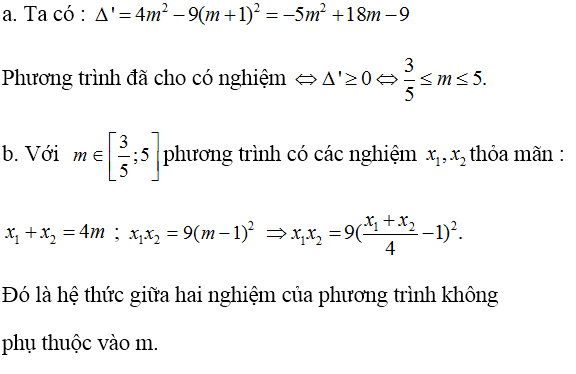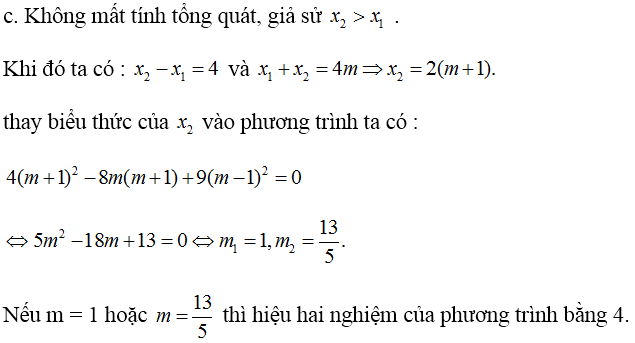Hãy nhập câu hỏi của bạn vào đây, nếu là tài khoản VIP, bạn sẽ được ưu tiên trả lời.

a/
\(x^3-2mx^2+2x^2-8x+8m-16=0\)
\(\Leftrightarrow\left(x^3+2x^2-8x-16\right)+m\left(-2x^2+8\right)=0\)
\(\Leftrightarrow\left(x+2\right)\left(x^2-8\right)-2m\left(x-2\right)\left(x+2\right)=0\)
\(\Leftrightarrow\left(x+2\right)\left[x^2-8-2m\left(x-2\right)\right]=0\)
\(\Leftrightarrow\left(x+2\right)\left(x^2-2mx+4m-8\right)=0\)
\(\Leftrightarrow\left[{}\begin{matrix}x=-2\\x^2-2mx+4m-8=0\left(1\right)\end{matrix}\right.\)
Pt có 3 nghiệm pb khi và chỉ khi (1) có 2 nghiệm pb khác -2
\(\Leftrightarrow\left\{{}\begin{matrix}\left(-2\right)^2+4m+4m-8=0\\\Delta'=m^2-4m+8>0\end{matrix}\right.\) (luôn thỏa mãn)
Vậy pt có 3 nghiệm pb với mọi m
b/ Do vai trò của \(x_1;x_2;x_3\) hoàn toàn như nhau, ko mất tính tổng quát, giả sử \(x_1=-2\) và \(x_2;x_3\) là 2 nghiệm của (1)
\(\Rightarrow\left\{{}\begin{matrix}x_2+x_3=2m\\x_2x_3=4m-8\end{matrix}\right.\) (2)
\(\left(-2\right)^2+\left(x_2+x_3\right)^2-2x_2x_3=5\left(-2+x_2+x_3\right)-4\) (3)
Thế (2) vào (3) là xong

1: \(\text{Δ}=\left(-m\right)^2-4\left(m-2\right)=m^2-4m+8=\left(m-2\right)^2+4>0\)
=>Phương trình luôn có hai nghiệm phân biệt
Theo đề, ta có: m-2<0
=>m<2
2: \(\Leftrightarrow\dfrac{x_1^2+1}{x_1}\cdot\dfrac{x_2^2+1}{x_2}=9\)
\(\Leftrightarrow\dfrac{\left(x_1\cdot x_2\right)^2+\left(x_1+x_2\right)^2-2x_1x_2+1}{x_1x_2}=9\)
\(\Leftrightarrow\dfrac{\left(m-2\right)^2+\left(-m\right)^2-2\left(m-2\right)+1}{m-2}=9\)
\(\Leftrightarrow m^2-4m+4+m^2-2m+4+1=9m-18\)
\(\Leftrightarrow2m^2-6m+9-9m+18=0\)
=>2m^2-15m+27=0
hay \(m\in\varnothing\)
3: =>m=0

a: =>x^2-8x+3-5+4m=0
=>x^2-8x+4m-2=0
\(\text{Δ}=\left(-8\right)^2-4\left(4m-2\right)\)
\(=64-16m+8=-16m+72\)
Để pt có hai nghiệm thì -16m+72>=0
=>-16m>=-72
=>m<=9/2
Theo đề, ta có:x1+x2<10
=>8/1<10
=>8<10(luôn đúng)
b: \(\text{Δ}=\left(-3\right)^2-4\left(-m+1\right)=9+4m-4=4m+5\)
Để phương trình có hai nghiệm thì 4m+5>=0
=>m>=-5/4
1/x1+1/x2=-4
=>\(\dfrac{x_2+x_1}{x_1x_2}=-4\)
=>\(\dfrac{3}{-m+1}=-4\)
=>-m+1=-3/4
=>m-1=3/4
=>m=7/4





\(\dfrac{x_2}{x_1}=\dfrac{x_3}{x_2}=\dfrac{x_2+x_3}{x_1+x_2}=\dfrac{x_2+x_3}{3}\) (1)
\(\dfrac{x_3}{x_2}=\dfrac{x_4}{x_3}=\dfrac{x_3+x_4}{x_2+x_3}=\dfrac{12}{x_2+x_3}\)
\(\Rightarrow\dfrac{x_2+x_3}{3}=\dfrac{12}{x_2+x_3}\Rightarrow x_2+x_3=\pm6\)
Th1: \(x_2+x_3=6\) thế vào (1):
\(\dfrac{x_2}{x_1}=\dfrac{x_3}{x_2}=\dfrac{x_4}{x_3}=\dfrac{6}{3}=2\) \(\Rightarrow\left\{{}\begin{matrix}x_2=2x_1\\x_4=2x_3\end{matrix}\right.\)
Mà \(\left\{{}\begin{matrix}x_1+x_2=3\\x_3+x_4=12\end{matrix}\right.\) \(\Rightarrow\left\{{}\begin{matrix}3x_1=3\\3x_3=12\end{matrix}\right.\) \(\Rightarrow\left\{{}\begin{matrix}x_1=1;x_2=2\\x_3=4;x_4=8\end{matrix}\right.\)
\(\Rightarrow m=x_1x_2=2\)
Khỏi cần làm TH2 \(x_2+x_3=-6\) nữa, chọn luôn C
đỉnh quá mài êyyyy